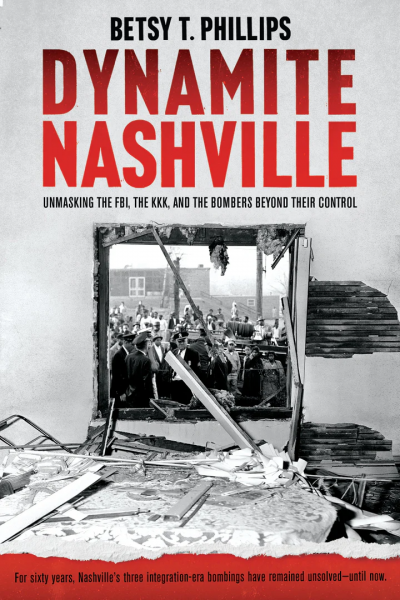In a city known for its music scene and rapidly changing skyline, the complex and often overlooked history of Nashville’s civil rights struggles has long remained in the shadows. Betsy Phillips, a local author and staff member at Vanderbilt University Press, is on a mission to change that narrative with her new book, Dynamite Nashville: Unmasking the FBI, the KKK, and the Bombers Beyond Their Control.
 The book revisits three historical bombings during Nashville’s integration era of the 1950s and 1960s—events that, despite their profound impact on the community, have largely been forgotten by the public. Phillips became interested in these stories after writing a piece on the Hattie Cotton School bombing, a pivotal moment that sparked her deeper dive into Nashville’s turbulent past. Dynamite Nashville details this bombing, another that took place at the Jewish Community Center, and a bombing at the home of civil rights attorney Z. Alexander Looby.
The book revisits three historical bombings during Nashville’s integration era of the 1950s and 1960s—events that, despite their profound impact on the community, have largely been forgotten by the public. Phillips became interested in these stories after writing a piece on the Hattie Cotton School bombing, a pivotal moment that sparked her deeper dive into Nashville’s turbulent past. Dynamite Nashville details this bombing, another that took place at the Jewish Community Center, and a bombing at the home of civil rights attorney Z. Alexander Looby.
“This book provides information about the town and how we’ve ended up here. Where the fault lines in our community are and why they’re there,” Phillips said.
Through extensive research, including navigating the challenges of accessing archival materials and Freedom of Information Act requests, Phillips has uncovered a complex web of racial violence, FBI complicity, and the brave individuals who fought back against the forces of oppression.
Making history accessible
Phillips emphasizes the importance of making these stories accessible to the communities they represent. “If you’re going to take people’s stories and retell them for your own entertainment, then you need to also be willing to put back into the communities,” she said.
This sentiment reflects Phillips’ deliberate approach to writing her book in an approachable style, avoiding the often-inaccessible language of histories. “If it was too dry and academic, it would just sit on a shelf and not reach the people who need to know this history,” she said.
By making these forgotten narratives more accessible to the general public, Phillips hopes to foster a deeper understanding of Nashville’s complex civil rights legacy and the ongoing fight for justice.
Phillips’ book provides a prelude to the racial violence of the 1960s. “It tells the story,” she said, “of how these bombers came together to learn how to terrorize communities, to blow up homes, schools and religious buildings, and to escape any meaningful justice.”
Storytelling leads to action
After the book’s release in July, Nashville Mayor Freddie O’Connell introduced Phillips at a book talk hosted at the Tennessee State Museum. During the event, O’Connell announced his recommendation for the Metro Nashville Police Department to reopen the cases related to the three bombings. He also recommended a review of Metro’s records retention policies to ensure that “important records are not lost to future generations.”